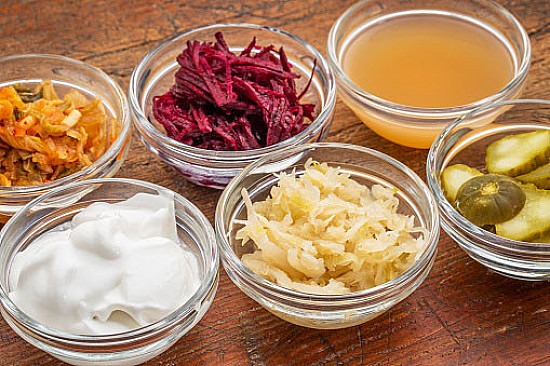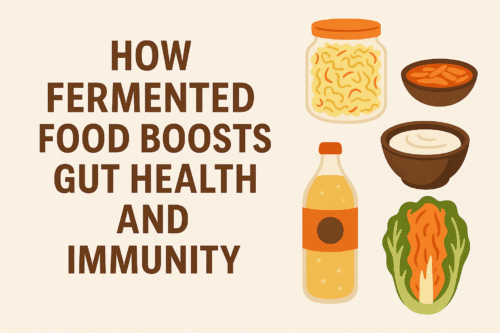Table of Contents
ToggleIntroduction
How Fermented Food Boosts Gut Health and Immunity is one of the most important discoveries in nutrition and wellness today. Your gut is home to trillions of microbes that influence everything from digestion to immune defense. When this delicate balance is disrupted by stress, poor diet, or antibiotics, your body becomes more vulnerable to illness. Fermented foods—like yogurt, kimchi, sauerkraut, and komb
In today’s wellness world, “gut health” has become more than just a trend—it’s a foundation of overall well-being. Science now shows that up to 70–80% of your immune system lives in your gut, making it the powerhouse for both digestion and defense against illness. One of the simplest, most natural ways to nourish your gut is through fermented foods.
From yogurt and kimchi to sauerkraut and kombucha, fermented foods are packed with probiotics, enzymes, and vitamins that not only improve digestion but also strengthen your body’s natural defenses. In this article, we’ll explore how fermented foods work, their benefits, the best ones to add to your diet, and how they compare with probiotic supplements.
If you’re looking for high-quality, organic fermented food options or probiotic supplements, we’ve included some trusted recommendations throughout this post..
“Fermented foods are just one part of a holistic approach to health. To truly thrive, it’s important to balance nutrition with exercise, mindfulness, quality sleep, and emotional well-being. Discover more in our guide on the 5 Pillars of Healthy Living.”
What Are Fermented Foods?
Fermented foods are foods that go through a natural process called fermentation. In this process, microorganisms like bacteria, yeast, or fungi break down sugars and starches into simpler compounds, creating lactic acid, alcohol, or gases.
This process not only preserves food naturally but also enhances its nutritional value. Some common fermented foods include:
- Yogurt – made from milk fermented with live cultures.
- Kefir – a probiotic-rich fermented milk drink.
- Sauerkraut – fermented cabbage packed with good bacteria.
- Kimchi – a spicy Korean dish made from fermented vegetables.
- Miso – a fermented soybean paste used in soups.
- Kombucha – a tangy fermented tea rich in probiotics.
The Science of Fermentation and Gut Health
Your gut is home to trillions of bacteria, both good and bad, collectively known as the gut microbiome. A healthy balance of this microbiome is essential for digestion, nutrient absorption, and even mood regulation.
Fermented foods act as natural probiotics, which means they feed and restore beneficial bacteria in your gut. Here’s how they help:
- Increase good bacteria: Fermented foods add more probiotics to your digestive system.
- Improve digestion: They help break down food more efficiently.
- Reduce harmful bacteria: The lactic acid produced during fermentation prevents the growth of bad bacteria.
This makes your gut more resilient and better equipped to fight infections.
How Fermented Foods Boost Immunity
A strong immune system starts in the gut. In fact, nearly 70% of your immune cells live in your digestive system. When your gut bacteria are in balance, your immunity becomes stronger.
Here’s how fermented foods support your immune health:
- Enhancing immune cells: Probiotics stimulate the production of antibodies and immune cells.
- Fighting inflammation: They reduce chronic inflammation, which weakens immunity.
- Building a defense wall: A healthy gut lining prevents harmful toxins and pathogens from entering your bloodstream.
That’s why people who regularly consume fermented foods often experience fewer infections, faster recovery from colds, and better overall health.
Key Benefits of Eating Fermented Foods
Adding fermented foods to your diet offers several scientifically proven benefits:

1. Better Digestion
They ease bloating, constipation, and indigestion by balancing gut flora.
2. Nutrient Absorption
Fermentation increases the bioavailability of vitamins like B12, K2, and folate.
3. Stronger Immunity
Supports the gut-immune connection, making your body more resilient.
4. Mental Well-being
A balanced gut reduces anxiety and stress (gut-brain connection).
5. Natural Detoxification
Fermented foods help the body flush out harmful toxins.
How Fermented Foods Boost Immunity
Fermented foods don’t just support the gut—they directly strengthen the immune system. Here’s how:
- Stronger Gut Barrier: Prevents harmful pathogens from entering the bloodstream.
- Boosts Antibody Production: Probiotics encourage immune cells to produce protective antibodies.
- Reduces Inflammation: Helps regulate immune response and lowers oxidative stress.
- Produces Natural Antibiotics: Certain probiotic strains fight off harmful bacteria.
Regular consumption can reduce the risk of colds, flu, and even autoimmune flare-ups.
Fermented Foods vs. Probiotic Supplements
You may wonder—why not just take a probiotic supplement?
While supplements are useful, fermented foods provide a broader range of probiotics along with enzymes, vitamins, and minerals that supplements may lack. Plus, they are delicious and versatile in your diet.
For example:
- A bowl of yogurt with fruit makes a probiotic-rich breakfast.
- Sauerkraut or kimchi can be paired with rice or sandwiches.
- Kombucha makes a refreshing drink alternative to soda.
How to Add Fermented Foods into Your Daily Diet
Incorporating fermented foods doesn’t have to be complicated. Here are some easy tips:
- Start small: Add a few spoonfuls of yogurt or sauerkraut daily.
- Pair them with meals: Fermented veggies go well with curries, sandwiches, or rice.
- Swap your drinks: Replace sugary drinks with kefir or kombucha.
- Try new recipes: Experiment with miso soup or fermented dosa batter.
Pro tip: Choose naturally fermented foods with “live and active cultures.” Avoid those with heavy preservatives or pasteurization, as they kill probiotics.
Best Fermented Foods to Add to Your Diet
1. Yogurt & Kefir
Rich in probiotics, protein, and calcium—great for digestion and bone health.
�� Affiliate CTA: Try Organic Greek Yogurt or Probiotic Kefir Drink to kickstart your gut health journey.
2. Sauerkraut & Kimchi
High in fiber, probiotics, and antioxidants. Sauerkraut is mild, while kimchi adds spice and extra vitamins.
�� Affiliate CTA: Discover Raw Organic Sauerkraut or Traditional Korean Kimchi here.
3. Miso & Tempeh
Soy-based options rich in protein, probiotics, and beneficial isoflavones.
4. Kombucha
A fizzy fermented tea loaded with probiotics and antioxidants.
�� Affiliate CTA: Shop Organic Kombucha Variety Pack for a tasty immune boost.
5. Regional Options
For Indian readers: idli, dosa, kanji, and buttermilk are everyday examples of natural probiotic foods.
Probiotic Foods vs. Probiotic Supplements
| Feature | Fermented Foods �� | Probiotic Supplements �� |
| Nutrients | Rich in vitamins, enzymes, and probiotics | Probiotics only |
| Strain Diversity | Multiple strains, naturally occurring | Targeted strains |
| Digestibility | Easier digestion, enzymes included | Depends on product quality |
| Cost | Often cheaper, homemade possible | More expensive long-term |
| Convenience | Must prepare or buy fresh | Easy to take daily |
| Best For | Overall gut health + nutrition | Targeted gut issues or after antibiotics |
�� Affiliate CTA: Can’t always access fermented foods? Check out these High-Quality Probiotic Supplements recommended by health experts.
Who Should Be Careful with Fermented Foods?
While fermented foods are healthy, some people should consume them in moderation:
- People with histamine intolerance may experience bloating or headaches.
- Those with IBS may find certain fermented foods trigger symptoms.
- Pregnant women should consult a doctor before trying unpasteurized fermented foods.
If you’re new, start with small portions and see how your body reacts.
DIY: Simple Fermented Foods at Home
Fermentation can also be done at home! It’s affordable and satisfying.
Example: Homemade Sauerkraut
- Shred fresh cabbage.
- Add salt and massage until juices release.
- Pack tightly into a jar and cover.
- Let it ferment at room temperature for 1–2 weeks.
That’s it—you’ve got your own probiotic-rich superfood!
Conclusion
While fermented foods work wonders for gut health and immunity, they are not a standalone solution. Lasting wellness comes from combining good nutrition with other essential practices. From staying active to maintaining mental balance, every choice you make supports your body’s natural healing power.
Fermented foods are more than just flavorful additions to your meals—they are nature’s way of keeping your gut healthy and your immune system strong. From yogurt to kimchi, every serving is a step toward better digestion, improved immunity, and overall well-being.
So, next time you’re at the grocery store, pick up a jar of sauerkraut or brew a batch of kombucha at home. Your gut and immune system will thank you.
Affiliate CTA: Ready to try? Explore Organic Fermented Foods and Probiotic Supplements today and give your gut the care it deserves.
FAQ Section
Q: Are fermented foods safe for everyone?
A: Most people can enjoy them, but if you have a weakened immune system, consult your doctor first.
Q: How often should you eat fermented foods?
A: Daily consumption is ideal—start small and increase gradually.
Q: Can fermented foods replace probiotic supplements?
A: They complement each other. Whole foods provide nutrients, while supplements offer targeted strains.
Q: How do you know if a fermented food is still good?
A: It should smell tangy, not rotten. Any mold or foul odor means it’s spoiled.



